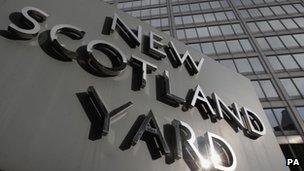Phone hacking: No charges for Guardian reporter Amelia Hill over 'leaks'
- Published

The detective constable was arrested in August last year
A Guardian journalist will not be prosecuted over the alleged leak of information on the phone-hacking probe, the Crown Prosecution Service has said.
It said there was insufficient evidence to charge Amelia Hill and a detective constable from Operation Weeting.
Prosecutors are to recommend disciplinary proceedings against the 51-year-old officer are considered for alleged Data Protection Act breaches.
The Met Police officer was suspended after being arrested in August 2011.
Ms Hill, the Guardian's special investigations correspondent, was not arrested but questioned under caution last September.
She had worked on a number of the newspaper's exclusives about phone hacking at the News of the World including the July 2011 revelation that it had accessed the voicemail of murdered teenager Milly Dowler.
The scandal saw News Corporation decide to close the News of the World and a number of its reporters have been arrested.
Alison Levitt QC, principal legal adviser to the Director of Public Prosecutions, said 10 articles written by Ms Hill between April and August 2011 "contained confidential information derived from Operation Weeting, including the names of those who had been arrested".
She said: "I am also satisfied that there is sufficient evidence to establish that the police officer disclosed that information to Ms Hill."
But she added: "I have concluded that there is insufficient evidence against either suspect to provide a realistic prospect of conviction for the common law offence of misconduct in a public office or conspiracy to commit misconduct in a public office."
In a statement, Ms Hill said: "I have spent the last nine months as the focus of a criminal investigation, under the threat of prosecution.
"This was not only incredibly difficult for me personally but was a completely disproportionate response by the police and the CPS, and a sinister attempt to chill public interest journalism."
In a statement on the Guardian's website, the paper said: "We welcome the Crown Prosecution Service's sensible decision to abandon this worrying attempt to criminalise legitimate contact between journalists and confidential sources.
"Nevertheless, the paper makes no comment on the validity of the Met Police assertion that the officer it identified was Amelia's source in this case."
'Public debate'
Interim guidelines issued in April require prosecutors considering conduct by the media to consider whether the public interest served outweighs the overall criminality alleged.
The CPS said bringing charges against Ms Hill or the officer under the Data Protection Act would also not be in the public interest.
In Ms Hill's case she was working with other journalists on a series of articles "capable of raising and contributing to an important matter of public debate", Ms Levitt said.
In the case of the police officer, no payment was sought or received, and the disclosure did not compromise the investigation.
Ms Levitt said she had written to the Metropolitan Police and the Independent Police Complaints Commission on the issue of possible disciplinary proceedings.
Also on Tuesday, as part of Scotland Yard's phone-hacking inquiry, the Met handed to prosecutors a case file involving a police officer accused of misconduct in public office and corruption.
One of four files to come from the phone-hacking probe still being considered by the CPS for charging advice, the others involve:
A journalist suspected of alleged offences under the Regulation of Investigatory Powers Act
A police officer in relation to an allegation of misconduct in a public office
A police officer in relation to alleged misconduct in a public office and other associated matters.